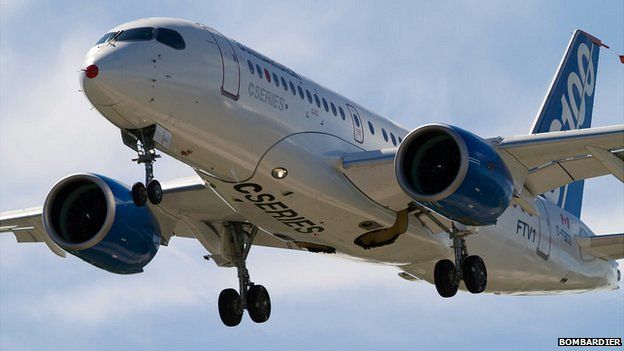Farnborough: Bombardier's new jet has difficult take-off
- Published

Another airshow, and another question mark over Bombardier's ambitious new passenger jet.
At last year's Paris show, Bombardier was triumphant about imminent test flights of its long-awaited C-Series aircraft. But the test schedule had to be pushed back a few months.
At Farnborough, the questions have been about what caused a C-Series engine failure during a ground test in May.
Test flights have yet to restart, despite the company saying it hoped to have the aircraft airborne again by the end of June.
The $4bn (£2.3bn) aircraft programme is supposed to be a game-changer for the Canadian company, taking it into a market for longer-range aircraft.
Designed from scratch, the all-new C-Series, with its claimed superior fuel and operating efficiencies, will compete in the market for 100-149 seat aircraft.
The company, known for producing smaller aircraft and corporate jets such as Lear (as well as trains), is now nibbling at the heels of industry giants Airbus and Boeing.
Nigel Cassidy on Bombardier, a challenger to the global might of Boeing and Airbus.
'Back in the air'
But along the row of Bombardier aircraft displayed here at Farnborough, the C-Series is conspicuous by its absence.
"It would have been great to have had the plane here," says Guy Hachey, the company's president and chief operating officer.
"We had a problem with the engine. We've found the root cause and are doing modifications. We are confident we will be back in the air in a few weeks."
There is a mock-up of a C-Series cabin at the show - and very impressive it looks, too. But it is not what potential customers hoped to see at the year's most important aviation trade fair.
Mr Hachey told the BBC that Bombardier remains on course to deliver its first aircraft in the second half of 2015, to Malmo Aviation. However, the C-Series was initially scheduled to enter service last year.
The longer the delays continue, the greater the risk that Bombardier's first-mover advantage is eroded as its competitors catch up.
Farnborough orders
The engine problems related to the oil system, says Mr Hachey. And if, as claimed, the changes require a modification rather than an engine overhaul then the resumption of test flights in weeks, not months, seems reasonable, analysts say.
But the C-Series needs to pass another 2,000-plus hours of test flights before it gets air certification. And no air certificate means no customers.
Significantly, though, the engine problems do not seem to have caused a wave of cancellations.
Five new customers have been announced at Farnborough, although these have been mainly letters of intent rather than firm orders.
Zhejiang Loong Airlines became the second Chinese company to want the jets, and Jordan's Petra Airlines also announced an intent to buy.
Falko Regional Aircraft, a UK-based leasing company, also signed letters of intent for 24 C-Series 100 jets. The company already has Bombardier's regional jets and turboprops in its leasing portfolio.
"It's a new-technology aircraft and it fits into a whole new category in the sector," says Mark Hughes, Falko's executive vice-president of corporate finance.
"We are confident about its future and positioning in our core marketplace. As we begin a period of worldwide growth and expansion with a strong pipeline of acquisitions, the C-Series aircraft will figure prominently in our plans."
'Achievable targets'
Mr Hachey refuses to be downcast about the fact that Air Canada, the national carrier in Bombardier's home country, has yet to place an order. The airline recently finalised an order for 61 Boeing 737 Max aircraft, with between 162-180 seats.
"These aircraft are designed for a different purpose," Mr Hachey says. "It does not mean Air Canada won't buy the C-Series."
Nor is there disappointment about the C-Series order book. It currently stands at 203 firm orders, from 19 customers.
Mr Hachey says: "The target is to secure 300 firm orders by the aircraft's entry into service next year." Achievable? "It will be achieved," he insists.
He sees the market for aircraft in the C-Series segment as being some 7,100 planes over the next 20 years. "We think we can take the lion's share," he says. "We've been studying this area for several years."
However, that demand estimate implies average annual sales of 355 aircraft - far below the average for the past few years.
'Long gestation'
"The market segment is under-served right now," Mr Hachey says. "We decided to optimise an aircraft for this segment." In other words, the C-Series will grab a bigger share of a bigger pie.
Analysts, though, are more cautious. "Bombardier is in a challenging position," says aviation consultant John Strickland.
"The C-Series has been through a long gestation. Other companies are competing now. The field is becoming more crowded, and airlines also want to squeeze manufacturers for a good deal."
Luckily for Bombardier, although Airbus and Boeing reach the lower end of the market segment with their A319 and 737, these planes are not competition for the C-Series. Nor do the two majors look like they will offer anything new.
But it is critical for Bombardier that the C-Series succeeds. Compared with Boeing and Airbus, Bombardier is a minnow. The smaller the firm, the bigger the execution risks.
It doesn't help that other parts of Bombardier are under pressure, such as the CRJ regional jet order book. Also, Brazil's Embraer, Japan's Mitsubishi and planemakers in Russia have a pipeline of competing products.
However, Damien Lasou, aerospace expert at consultants Accenture, says Bombardier is in a stronger position than some competitors.
"They (Bombardier) have a bit more diversity in the product range. And now they've decided to go up the scale. I think that puts them in a better place."